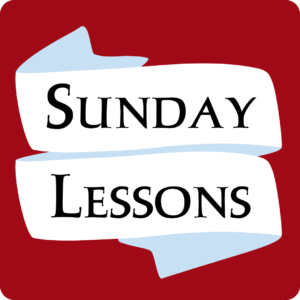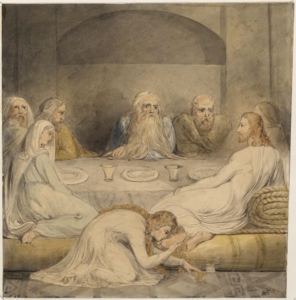Worship Guide for April 6, 2025
Like TV Guide, but from God! Find the text of the Prayers of the People and Sermon below. Use the buttons provided to find other worship materials.
To see the Worship Guide for other weeks, click here.
Prayers
Weekly Prayer List Recording:
Fifth Sunday in Lent
April 6, 2025
The response to the bidding, “Merciful Lord,” is “turn again our hearts”
Lord in time and space, for the keeping of a Holy Lent we ask that you give us a spirit of true repentance so as to have the courage and persistence to hold fast to the hope that is within us in a world increasingly deaf to the values and expectations of your kingdom. Merciful Lord, turn again our hearts.
We pray for the Church and her life: For Sean, Presiding Bishop, and Nicholas, our bishop; for Hosam, Archbishop of Jerusalem; for Pope Francis; for Bartholomew, Ecumenical Patriarch, and other Christian leaders. Merciful Lord, turn again our hearts.
We pray for the world and its pressing needs, remembering with concern and praying especially: for a return of Israeli hostages and an end to the systemic massacre of civilians in Gaza; for an end to unrestrained Israeli violence towards Palestinians and their communities in the West Bank; for the coming of peace with justice to the Holy Land.
We continue to pray for a negotiated peace in Ukraine that honors a commitment to Ukrainian sovereignty and future self-determination.
We remember the Turkish people during this time of escalating civil unrest. Merciful Lord, turn again our hearts.
We pray for the nation, mindful of so many concerns at this time:
You are invited to bring your concerns for our country either silently or aloud.
We pray for the Congress and the Courts to uphold the integrity of the Constitution and defend the Rule of Law.
We decry the continued attack on effective government service, remembering all affected by sudden termination of employment. We pray especially for the Department of Education, the Centers for Disease Control, the Food and Drug Administration, and the National Park Service. Merciful Lord, turn again our hearts.
We remember the earth, our increasingly fragile island home. We pray for the those caught up in the aftermath of the earthquake in Myanmar and for the difficult work of Burmese first responders. We continue to pray for wise leadership in strengthening of our own emergency services and necessary infrastructure to meet the growing challenges of climate instability. Merciful Lord, turn again our hearts.
We pray for all in need and in any kind of trouble: for those whose strength is failing through ill health; whose spirits are flagging through depression; whose determination is being sapped through addiction; that they might know God’s comforting presence and healing. Merciful Lord, turn again our hearts.
We remember with love those who have asked for our solidarity in prayer: Mary, Sam, Benjamin, David, Margaret, and those we name. Merciful Lord, turn again our hearts.
We pray for our own needs, together with those nearest and dearest to us, remembering especially those celebrating birthdays this week: Heather Annis, John Ditson, and Sheila Hoogeboom. Merciful Lord, turn again our hearts.
Rejoicing in the fellowship of so great a cloud of witnesses, we remember those we love but see no longer, especially those we name. We remember everyone coming to terms with the loss of a loved one. Merciful Lord, turn again our hearts.
Celebrant adds a concluding prayer.
Sermon Recording:
Scandal
The Reverend Linda Mackie Griggs
Lent 5, Year C
Six days before the Passover Jesus came to Bethany, the home of Lazarus, whom he had raised from the dead.
The first sentence in today’s Gospel reading tells us a little bit about the context of our story, but not enough. We know everyone is preparing for the celebration of Passover. And we know that Jesus is visiting his formerly dead friend. What we don’t know from the passage is what has gone on behind the scenes since Lazarus emerged from his tomb, burial wrappings and the scent of death trailing behind him.
It is probably no surprise that witnesses to the raising of Lazarus reported back to Jerusalem, which precipitated tense discussion among the religious authorities. As I noted a couple of weeks ago, the Roman governor, Pontius Pilate, expected those who disturbed the peace and quiet of Herod and his corner of the Empire to be reported and arrested—or else–and what Jesus had done in Bethany definitely counted as a disturbance. So a council meeting was called. Members urged, “If we let him go on like this, everyone will believe in him, and the Romans will come and destroy both our holy place and our nation.” The high priest, Caiphas, said that it would be better for one man to die than for everyone to suffer. So plans were put in motion to kill Jesus who, now officially a wanted man, decided to lay low for a time with his disciples in Ephraim, near the wilderness.
So that’s the context. Jesus went, if not into hiding, then at least to a less public location. But as Passover approached, he emerged and made his way to Bethany. The storyteller of John’s Gospel doesn’t say specifically why, but it’s fair to speculate that he returned because he wanted to be with his friends before embarking on the last leg of his journey to Jerusalem.
And the Cross.
This stopover in Bethany to be with Lazarus, Martha, and Mary was liminal time between the final days of Jesus’ ministry and the beginning of his Passion.
And in this liminal, threshold, time, “they gave a dinner for him. Martha served, and Lazarus was one of those reclining with him.” Who were “they?” Members of the community, perhaps, wanting to celebrate–like the father in last week’s story of the Prodigal—one who had been lost but was now found; one who had been literally dead, and was alive again. There was joy in this liminal time and space. Joy, even as the threat of death lurked outside the door; joy, even as Lazarus’ very presence reminded them of his four days spent in the tomb; reminded everyone that they had grieved for four full days before, against all odds, welcoming him back into the community.
This liminal time, then, was rife with contradiction—so it was perhaps not just a threshold, which is how we usually envision liminal space, but it was also a crossroads. An intersection of joy and death, with Jesus at the center.
Into this space enters a woman, carrying a jar.
And here is the heart—the true heart, of this Gospel passage.
The story of a woman anointing Jesus appears in all four Gospels—a rare distinction. Each version has its own variations, but all inhabit the basic framework of 1) a woman anointing Jesus, 2) to the dismay of witnesses, and 3) followed by a rebuke by Jesus of those who criticize the woman’s actions.
But only in John’s Gospel does the woman have a clear backstory. (Yes, Luke’s Gospel refers to a “sinful woman,” but she may have simply been a non-observant Jew; it is history and patriarchy that have painted her with a scarlet brush.) And only in John’s Gospel does the woman have a name. Mary, sister of Lazarus, who had sat at Jesus’ feet in a previous visit, arguably a disciple in her own right. Mary, who grieved the death of her brother and accused Jesus of dereliction of duty, sobbing, “If only you had been here, my brother would not have died.” Mary, whose brother was given back to her by Jesus.
Mary is the woman who enters the space, carrying a ridiculous amount of nard—the scent very earthy and woodsy. Nard was used in preparation of bodies for burial. As an ointment spread on the skin, it helped the powdery myrrh and other spices adhere to the body before wrapping it in cloth.
The fragrance fills the room, bringing up all kinds of associations and questions in the minds of those who are watching. Remembering Lazarus’ death. Anxiety about Jesus’ fate upon his impending arrival in Jerusalem. Wondering at the sheer extravagance. Wondering, perhaps, why did Mary not use this for her brother’s burial? Why Jesus, why now? The fragrance is weighted. Pregnant.
Mary removes her head covering, unbinds her hair, and bends down to cradle Jesus’ feet in her hands–gently, generously, pouring oil on his skin and wiping the excess off with her hair. It is a moment of astonishing intimacy. We are tempted to describe it as scandalous, but we should take care with such a label. Those who witness Mary’s care for Jesus know her well; they know her as a disciple who has paid close attention to Jesus’ teachings about the Dream of God. They know her as a loving sister filled with unbounded joy and gratitude at the restoration of her brother. They know her grief, her joy, her faith. The intimacy—the scandal—is not what we have been conditioned to think. It is the intimacy and scandal of the Gospel.
The storyteller wants us to understand Mary’s anointing of Jesus’ feet–not his head–for two reasons. One is the upside-down scandal of the Dream of God—that Jesus’ kingship is not of this world. More important, though, is the same thing John prioritizes in his account of the Last Supper, in which the focus is not on bread and wine, but on foot washing; the scandal of Jesus kneeling and washing the feet of his friends, then mandating the same kind of acts of love and service to one another and to the world. So, even before the Last Supper, Mary already gets it. She has already internalized the upside-down scandal of God’s servant kingship.
There is also the scandal of symbolically participating in Jesus’ upcoming death by drying his feet with her hair; taking the fragrance of death and burial upon herself in an astonishing expression of her faith that death will not have the last word in the Dream of God. The scandal of joy in the face of death.
And of course there is the scandal of generosity. Outrageous, ridiculous, year’s-worth-of-salary generosity. Enough-to-raise-Judas’-blood-pressure generosity. But Judas’ claims that the nard should have been sold and proceeds given to the poor shows that he has profoundly missed the point. In his focus on what he perceives as waste, he has missed the joy, love, and faith motivating Mary’s gift. He has missed the point that God’s economy is one of prodigious generosity.
“You always have the poor with you…”
The scandal of this statement, of course, lies in how it has been transformed into an excuse for complacency. The better translation is that you will always be with the poor. We will always be with all of the vulnerable—why? Because that is what Jesus, and the Dream of God call us to. Especially in these days, we cannot afford to throw up our hands, either in despair or worse, in the mistaken assumption that it doesn’t affect us personally. And even worse than that, that we might actually be waiting until it affects us personally to act. As journalist M. Gessen has written regarding the erosion of transgender rights,
“The reason you should care about this is not that it could happen to you but that it is already happening to others. It is happening to people who…have rights just because we are human.”
Because we are human. Poor humans, migrant and refugee humans, queer humans, humans of color, disabled humans, young and elderly humans…
Children of God humans, and every one of us a neighbor.
Mary gets that. She incarnates Jesus’ challenge to face the reality of death and brokenness with clear-eyed faith and hope, in a spirit of gratitude, generosity, and solidarity with the most vulnerable. Mary’s actions of loving presence to her friend and Savior point us to that cross-shaped place that is the intersection of love and loss, joy and grief; the place where we find Jesus. That is the scandal, and the heart, of the Gospel.





